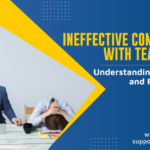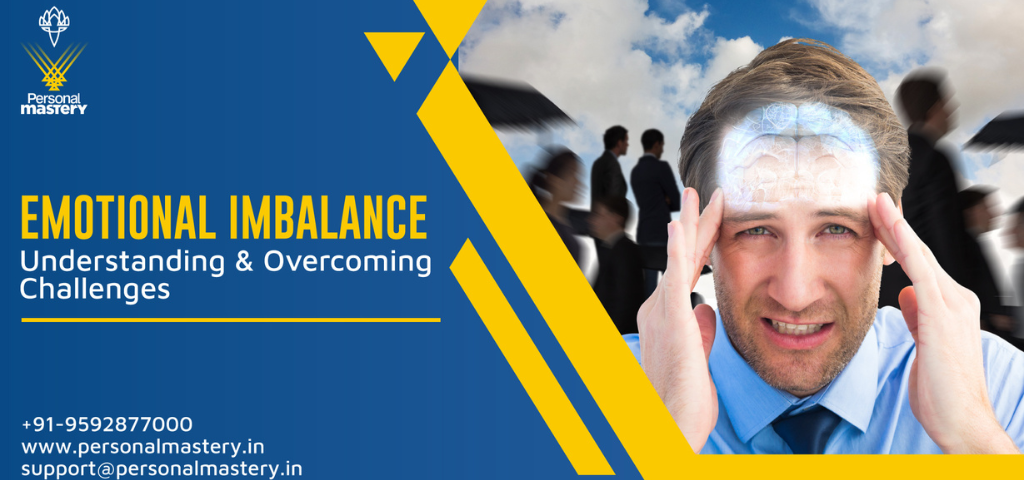
Ineffective Communication with Team Members: Understanding the Challenges and Finding Solutions
December 21, 2024
How Mindfulness Meditation Enhances Professional Performance
January 2, 2025Emotional disharmony has developed into a common difficulty in all aspects of life, including family and careers. It indicates the inability to control emotions and that could lead to stress, anxiety, or feeling unconfident. Though it may emerge from unresolved issues, peer pressure from work, or life misfortune, emotional instability could make a serious dent in mental health, relationships, and productivity. Using the right tools and techniques, such as NLP (Neuro-Linguistic Programming) and skills training in emotional intelligence, one can overcome those challenges and carve a passage toward balance and growth.
What is Emotional Imbalance?
Emotional imbalance is a state in which the individual fails to regulate the feelings. It generally causes excessive mood swings, irritability, emotional disconnection, and often makes mundane interactions and responsibilities feel overwhelming. Aggravated imbalance among thoughts, feelings, and behavior yields difficulties in decision-making, strained relationships, and a sense of hopelessness.
Causes of Emotional Imbalance
- Chronic Stress: Prolonged exposure to stress disrupts mental equilibrium and hinders emotional regulation.
- Unresolved Trauma: Past experiences, if unaddressed, can resurface and trigger emotional instability.
- Lack of Self-Awareness: Without an understanding of one’s emotions, managing them becomes challenging.
- Poor Communication Skills: Misunderstandings or conflicts often arise from ineffective communication, worsening emotional strain.
- Work-Life Imbalance: Excessive workload or lack of personal time contributes significantly to emotional turmoil.
How NLP and Emotional Intelligence Can Help
The courses in NLP techniques and emotional intelligence certification offer practical strategies for managing emotional instability. These programs will help an individual:
- Enhance Self-Awareness: Understand what triggers you emotionally and be able to articulate those patterns.
- Develop Self-Regulation: Develop self-regulation: Know your impulsive responses, learning to redirect them into a calm response.
- Improve Communication Skills: Learn how to connect more authentically through body language and non-verbal communication.
- Reframe Negative Thoughts: Change one’s mindset from limiting to empowering.
- Encourage Empathy: Understanding in others their emotional states, and hence a harmonious relationship.
Strategies to Overcome Emotional Imbalance
1. Practice Mindfulness
Mindfulness techniques, like meditation and focused breathing, calm the thinking process, thus reducing stress. These practices promote presence and awareness, which are, inescapably, catalysts for enabling a person to manage emotions.
2. Reframe Negative Beliefs
Negative thoughts usually bring emotional instability. NLP techniques replace negative thoughts with positive affirmations that change how one perceives a situation, boosting confidence.
3. Build Communication and Interpersonal Skills
Effective communication is important to resolve conflicts and build understanding. Training in conflict resolution and enhancing communication and interpersonal skills can considerably ease the strain of emotions.
4. Invest in Leadership Skills Training
Leaders are often under tremendous pressure to manage teams and handle conflicts. In leadership skills training and accredited certification in leadership programs, one learns how to manage personal emotions while motivating others and making the best decisions in times of stress.
5. Seek Professional Guidance
Programs such as Train the Trainer courses and emotional intelligence certification programs enable structured learning that increases emotional mastery. These courses provide practical techniques to redress both personal challenges and professional effectiveness.
Case Study: Ananya’s Journey to Emotional Balance
The HR manager, 35-year-old Ananya from Pune, was caught up in emotional imbalances-getting caught-in trampling stress from the workplace and personal life. Her poor handling of conflict and emotion hence strained her relationships, both at work and home.
Ananya decided to join the Personal Mastery courses under the guidance of Prabhleen Gupta, a renowned trainer working on leadership and emotional intelligence. The accredited emotional intelligence program assisted in:
- Enhance Self-Awareness and Self-Regulation: Journaling and mindfulness exercises helped her with recognition of emotional triggers and responding rightly with calmness in stressful situations.
- Improve Communication Skills: Encouraging active listening and empathetic responses to her superiors.
- Reframe Negative Thoughts: By the help of NLP techniques, she began to think positively about her challenges.
- Develop Soft Skills Training: These soft skills boosted her confidence and her workplace performance.
In six months, Ananya had transformed fully into a much more confident and composed professional. She began receiving feedback from her team about the vast improvement in her style of leading, which contributed to enhanced cooperation and productivity.
Benefits of Overcoming Emotional Imbalance
- Enhanced Decision-Making: Emotional stability Encourages clarity, enabling better choices.
- Improved Relationships: Healthy communication builds trust and reduces conflicts.
- Increased Productivity: A focused mind increases efficiency and achieves success.
- Personal Growth: With emotional stability comes strength and fulfillment.
The Role of Emotional Intelligence in Tackling Imbalance
Emotional intelligence for leaders is so much essential for the solving of emotional imbalance. The major ones include::
- Self-Awareness: Marking personal emotions and how they influence one’s actions.
- Empathy: Connecting with the feelings of others to build rapport in the workplace.
- Social Skills: Assisting in building relationships for effective collaboration and communication.
Conclusion
Emotional imbalance can be negative for personal or professional life, but establishing proper strategies can help regain control and thrive. Some techniques like mindfulness and NLP training can build resilience, while training in leadership can provide emotional stability. Invest in programs such as Train with Prabhleen Gupta or attend certified coaching courses in India and embark on this life-changing journey to self-improvement.
Just like Ananya balanced emotional and professional success, similarly, you can unleash your very own potential and live a fulfilling life. Start today with the right guidance and tools.
Contact Us
Phone: +91-9592877000
Email Id: support@personalmastery.in
Address: #748, Sector 9, Panchkula (Chandigarh), Haryana (INDIA) – 134113
FAQs for the Blog on Emotional Imbalance
- What is emotional imbalance, and how does it affect daily life?
Emotional imbalance refers to the inability to regulate emotions, leading to excessive mood swings, irritability, and a sense of being overwhelmed. It can negatively impact mental health, relationships, decision-making, and productivity. - What are the main causes of emotional imbalance?
Common causes include chronic stress, unresolved trauma, lack of self-awareness, poor communication skills, and an unhealthy work-life balance. - How can Neuro-Linguistic Programming (NLP) help in overcoming emotional imbalance?
NLP techniques can reframe negative thoughts, enhance self-awareness, develop self-regulation, and improve communication skills, empowering individuals to regain emotional stability. - What strategies can I use to overcome emotional imbalance?
Effective strategies include practicing mindfulness, reframing negative beliefs, building communication skills, seeking leadership training, and enrolling in emotional intelligence certification programs. - What are the benefits of addressing emotional imbalance?
Overcoming emotional imbalance leads to enhanced decision-making, improved relationships, increased productivity, and personal growth. It fosters a fulfilling and balanced life.


